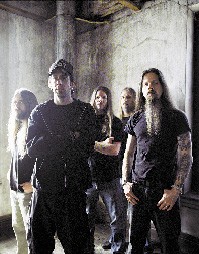As arguably one of the biggest acts to emerge from the mid-’00s “undergrounding” of high-profile metal, Lamb of God was riding its long and continuing ascent in June 2012 when attention on the band began to increase exponentially on the back of a most unfortunate turn of events. A good six months into the touring cycle behind his band’s seventh studio album, Resolution, Lamb of God singer Randy Blythe was arrested by Czech police on suspicion of manslaughter and charged with “committing intentional bodily harm.”
The charges concerned a concert from two years earlier when a fan sustained head injuries (immediately leading to a coma and eventual death several weeks later) after being pushed from the stage by Blythe. Lamb of God was caught totally by surprise, as they didn’t even remember the specific show and were unaware of the damning European press coverage following the event, or that the Czech police had already investigated and charged Blythe, simply because no one was contacted by the United States Department of Justice after the D.O.J. turned down overseas requests for assistance.
Blythe was swiftly put behind bars in a Czech prison for what remained an open-ended incarceration, due to the challenges of meeting a bail figure that was repeatedly increased. Thus began an unpredictable and authentically dramatic saga unlike any other in metal’s long and dark history of finding itself on the wrong side of the law. In March of 2013, after a six-day trial that could have easily ended badly, the Czech court arrived at a verdict that removed Blythe’s criminal liability regarding the incident. Many readers might be aware of how things played out, as there was much media coverage and an astonishing amount of support that traversed and transcended the metal community.
The Richmond, Virginia, band formed as Burn the Priest in 1994 and operated at the underground DIY level for six years, releasing several demos, two split-EPs, and one self-titled, full-length debut in 1999 before a name change to Lamb of God was implemented based on a desire to avoid being misinterpreted as a Satanic metal band. The next album and first to carry the Lamb of God moniker was 2000’s New American Gospel. A progressive combination of rewired and intensified thrash metal informed deeply by Pantera’s mid-tempo groove and breakdowns, New American Gospel appealed out of the gate to a fan base that would grow behind the band’s next two years on the road.
2003’s As the Palaces Burn attracted some nice reviews in mainstream media outlets like Rolling Stone and scored high in the metal press’ year-end tallies. The Lamb of God sound was well-established by this point and filled a need with its less cartoonish, more streamlined metal onslaught that spoke to both young and old fans of the form, unlike the then-waning silliness of Slipknot or the overt faux intensity of System of a Down. The increased airplay of the album’s three singles laid the groundwork for Lamb of God’s proto-breakthrough, Ashes of the Wake, their first for major label Epic Records. It debuted at No. 27 on the Billboard 200 with first-week sales of over 35,000 and remains the band’s best-selling back catalog title as it approaches gold certification.
But Lamb of God’s next two albums, 2006’s Sacrament and 2009’s Wrath, would secure the band’s status as a global force and perhaps the biggest Trojan horse to sneak otherwise mainstream-untenable elements of metal extremity to a wide audience since Pantera’s similar coup during the ’90s. Both album’s debuted at No. 2 on the Billboard 200 and had first-week sales of over 60,000 and collectively yielded three Grammy nominations for Best Heavy Metal Performance for “Redneck” (perhaps Lamb of God’s best-known calling card) in 2007, “Set to Fail” in 2010, and “In Your Words” in 2011, respectively.
This period brought many other next-level “firsts,” and the band spent the better part of six years on the road and satiated fans between studio efforts with two live album/DVD titles. In 2010, the band released the 10-year anniversary Hourglass career retrospective that featured a much-drooled-over “Super Deluxe” edition packaged in a big coffin. The package contained a three-CD anthology, a career-covering vinyl box set, The Art of Lamb of God book, a 4-by-6 “Pure American Metal” flag, and, most notably, a Mark Morton Signature Series Jackson Dominion D2 guitar. The aforementioned seventh album, Resolution, was released in January of 2012 and added some thrashier guitar riffs and song structures to Lamb of God’s meat-and-potatoes metal to keep things out of an artistic rut.
Then, as covered previously, everything went to hell a few months later, and a short hiatus followed as the band waited for the outcome of Blythe’s case and figured out what to do next. For a minute, Lamb of God’s future as an active band was up in the air, but the five-some returned to the studio, and out came last year’s VII: Sturm und Drang, an album informed by the inevitable influence of Blythe’s situation but also one with more sonic surprises than the band is known for. The record included the distinct vocals of guest Chino Moreno of the Deftones on a track, plus Blythe’s most extended venture into clean singing on the song “Overlord”.
